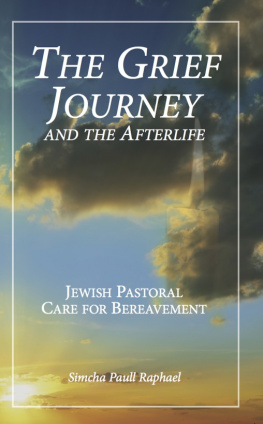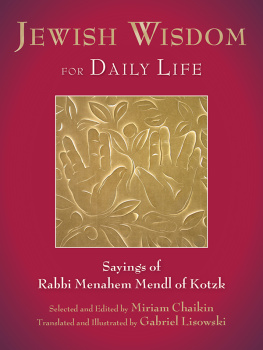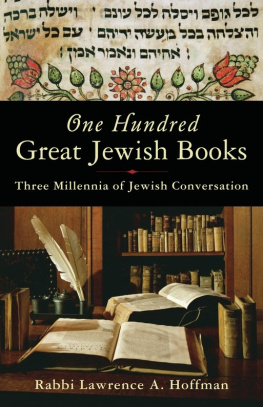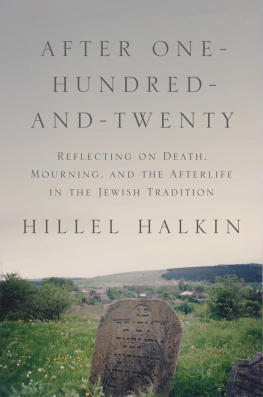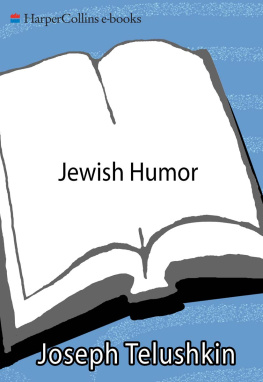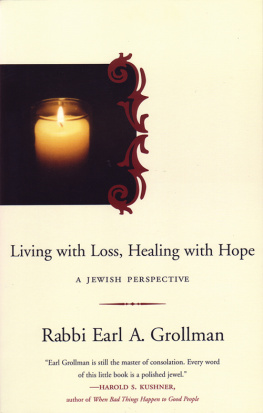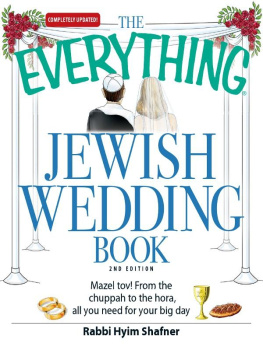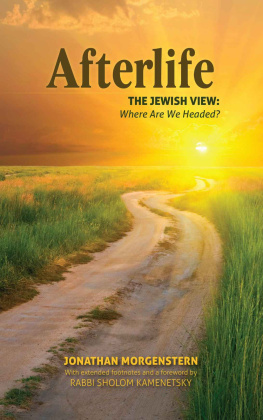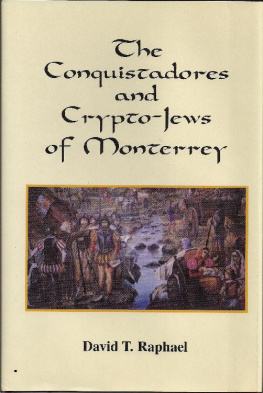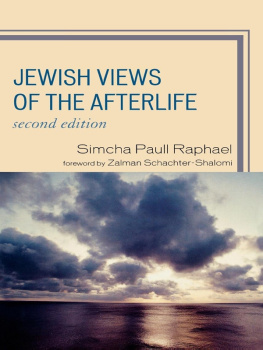The Grief Journey
and the Afterlife
Jewish PastoralCare
for Bereavement
Jewish Life, Death, andTransition Series
Simcha PaullRaphael
Published by Albion-Andalus Books at Smashwords
Boulder, Colorado 2015
The old shall berenewed,
and the new shall be madeholy.
Copyright 2015 SimchaPaull Raphael
Published in conjunctionwith the Daat Institute for Death Awareness, Advocacy andTraining. Originally published as Grief and Bereavement in Jewish Pastoral Care, 2nd Edition- A PracticalHandbook from Traditional & Contemporary Sources , 2013, edited by Rabbi DayleA. Friedman, Jewish Lights Publishing, Woodstock, VT.www.jewishlights.com.
Appendix B, The AfterlifeAccording to the Zohar was originally published as Afterlife:Medieval Judaism in Encyclopedia of theBible and Its Reception , Vol. 1. Berlin:Vaerlag Walter de Gruyter, 2009.
This ebook may not bere-sold or given away. No part of this book may be reproduced ortransmitted in any form or by any means, electronic or mechanical,including photocopy, recording, or any information storage orretrieval system, except for brief passages in connection with acritical review, without permission in writing from thepublisher:
Albion-Andalus,Inc.
P. O. Box 19852
Boulder, CO80308
www.albionandalus.com
Design and layout byAlbion-Andalus Books
Cover design by DarylMcCool
ISBN: 9781311332103
In memory of
Michelle Goodman,zl
my friend and colleagueat
The Benjamin Institutefor
Community Education andReferral
Toronto, Ontario
Contents
Preface
My mother was ten yearsold when her father was tragically killedin a car accident. Overnight, my maternal grandmother, thirty-threeyears old at the time, became a widow with three young children, mymother the oldest. I can only imagine what this trauma was like forher family in 1933, long before single moms and widow-to-widowsupport groups were a normal part of society.
Growing up, I often heard my mother speak ofher father. With a bittersweet sense of loss, she would sharetreasured memories of her father from her childhood and what herfamily life was like after his death. He was gone, but his life andthe impact of his death were never forgotten.
Twenty-two years later, in 1955, my motherlost her mother as well. My grandmother was very dear to me as achild, and I recall missing her very much. But I also recallfeeling a sense of her presence for many years to come after herdeath. And again, as she had done about her father, my mother spokefrequently of her mother. Remembering her life and grieving herloss were again intricately interwoven.
After working as a bereavement counselor anddeath awareness educator for over three decades, I have come torealize that the roots of my own philosophy of death and grief werelearned almost by osmosis from my mother. Although I did not fullyunderstand it at the time, as a child, I knew that death was simplya part of life. In our family, we spoke of the dead and rememberedtheir lives and legacy. Death was not denied, nor was it glorified.Death was painful, but real. And in remembering the dead, not in amorbid sense, but lovingly, I learned that the connection betweenthe living and the dead continued long after the death of thephysical body.
It is this understanding of the humanencounter with death and loss that underlies and informs this smallbook on Jewish pastoral care for grief and bereavement.
In writing about a Jewish approach to griefand bereavement, I endeavor to demonstrate that there are veryeffective ways of mourning the dead, honoring the grief one goesthrough, making use of traditional Jewish death practices andstaying open to the ever-changing mystery of the interconnectionbetween the world of the living and the world of the dead.
In the pages that follow, I present a modelof the bereavement journey that shows the interconnection betweenthe contemporary psychology of grief, traditional Jewish deathrituals, and the little-known Jewish understanding of the afterlifejourney of the soul. While much has been written on each of thesetopics, this book is perhaps unique in demonstrating the ways inwhich an understanding of both Jewish views of the afterlife andtraditional Jewish grief rituals help mourners go through theprocess of bereavement and healing in the face of death andloss.
Much of the material forthis book was originally published as a long article in Jewish Pastoral Care: APractical Handbook from Traditional andContemporary Sources , edited by RabbiDayle Friedman, a book written specifically for chaplains and thoseproviding pastoral care to individuals and families. As a result,this book speaks directly to pastoral care professionals. However,the ideas contained herein are equally applicable for those workingwith the dying and bereaved, for anyone wishing to understand thespiritual efficacy of Jewish death rituals, and for those who mightbe wrestling with death and bereavement in their ownlives.
This is the first book inthe Jewish Life, Death and TransitionSeries being published by Albion-Andalus Books. The goal of thisseries is to present Jewish spiritualwisdom on various aspects of the humanencounter with death that can be used aspractical resources for dealing withaspects of dying, the deathbed, the funeral and burial, as well as grief and bereavement.
I wish to thank NetanelMiles-Ypez, the publisher of Albion-Andalus Books for his supportof my work in choosing to create the Jewish Life, Death and Transition Series , and for his editorial acumen in bringing this book topublication. I also offer my appreciation to Rabbi Dayle Friedmanwho edited the earlier version of the material. Additionally, Ithank Michael Benjamin, of Benjamins Park Memorial Chapel. Almostthirty years ago, I was hired by Michael Benjamin to develop abereavement support program in conjunction with the servicesprovided by the Benjamins Park Memorial Chapel, a Jewish funeralhome serving in Toronto, Canada. What I learned as residentpsychologist at Benjamins Park Memorial Chapel has lasted for alife-time, and I am ever-grateful to Michael Benjamin for giving methe opportunity to learn about grief and loss in the front-lines ofserving people in acute grief.
Finally, I offer my gratitude to the HolyOne of Blessing Who has provided me the opportunity to share thefruits of my learning with others, and Who has given us life andvitality, sustained us, and brought us to this moment.
Simcha PaullRaphael , Melrose Park, PA
November 17th, 2014
24 Heshvan 5775
Introduction
Centuries ago, when thegreat Rabbi Israel Baal Shem Tov would seek divine guidance, it washis custom to go to a certain spot in the forest to meditate. Therehe would light a fire, say a special prayer, and the wisdom heneeded would be granted to him. Later, when his disciple, thecelebrated Magid of Mezritch, had need to seek divine wisdom, hewould go the forest and say: Master of the Universe, listen! I donot know how to light the fire, but I am still able to say theprayer. And again the wisdom needed would be granted to him. Stilllater, Rabbi Moshe-Leib of Sasov, in times of dire need, would gothe forest and say: I do not know how to light the fire, I do notknow the prayer, but I know the place, and this must besufficient. It was sufficient, and his request for divine guidancewas achieved. Then the time came when Rabbi Israel of Rizhyn hadneed of divine guidance. Sitting in his armchair, head in hishands, he spoke to God: I am unable to light the fire, and I donot know the prayer; I cannot even find the place in the forest.All I can do is tell the story, and this must be sufficient. Andit was sufficient .
Since the advent of modernity, many Jewish spiritual practiceshave been lost through acculturation and assimilation. Theefficacious secrets Jews once used to attain wisdom and live aspiritually inspired lifestyle have been watered down, forgotten orsimply disappeared. This is particularly the case with regard toJewish
Next page
